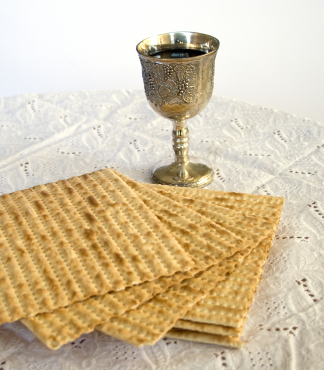 Someone raised a discrepancy today: Unleavened bread is commanded to be eaten in the Laws of Moses for seven days (Exodus 12:14-16). Yet contemporary observance in the Diaspora goes for eight (thus ending tonight and not last night as in Israel). The conversation which followed was enriching for me at least, so thus I am producing some of my findings.
Someone raised a discrepancy today: Unleavened bread is commanded to be eaten in the Laws of Moses for seven days (Exodus 12:14-16). Yet contemporary observance in the Diaspora goes for eight (thus ending tonight and not last night as in Israel). The conversation which followed was enriching for me at least, so thus I am producing some of my findings.So how did this tradition come about? I had ideas but was not sure, so I googled to get concise truth.
From one traditional Q & A site:
Jewish holidays are established based on the lunar cycles. During Temple times, witnesses would come to the Temple in Jerusalem and testify that they had seen the new moon the previous night. After careful interrogation and corroboration, the new month would be declared. Messengers would then be sent to the environs informing the general populace when the month began. These messengers traveled as far as 11 days journey. Jews living outside the eleven day radius would keep an extra day due to the doubt as to which day was actually holiday.Another Rabbi notes the general time frame:
In the 5th century BCE, when Jewish unity was threatened by the exile from Israel, the patriarch Hillel II set a perpetual calendar and instituted an official 'Second Day Yom Tov'.Okay, but if we can figure it out now, why was the 8th day permanent thereafter?
In order to make a distinction, to add to the Jewish awareness that one is living in the Diaspora and does not claim permanent residence in the Holy Land. And thus the 8th day of Passover.Naturally for some it may be a matter of asserting biblical accuracy to say that, unlike those who follow tradition, they keep seven days of unleavened bread. But I wonder, is going out of one's way to distinguish oneself on this matter the right posture?
I don't imagine that from a New Covenant perspective there would be something wrong per se with stopping at seven. There is a presuppositional reason I have for this: that the New Covenant gives wide liberty for the way one lives out his faith in Messiah as regards to times and observances, and Messianic believers are under the authority of the New Covenant in understanding and living out Torah. (we are not under the Mosaic Covenant per se, though we are instructed by it and all Scripture as now seen through the New Covenant text). I understand that some may want to challenge this point about liberty, or at least the way I state it, but in any case its hard to imagine that disagreement implying a general halakha which requires eight day observance.
However, for even stronger reason, I wish that remarks against "keeping eight days" as "biblically inaccurate" be something that no followers of Yeshua have in their repertoire. On the surface it sounds righteous, but on the inside it ain't. For one thing, Yeshua's Passover with his disciples not only respected, but made inspired use of Jewish tradition, something seen for example in his use of the four cups (which I mused on here). That was an element not found in Mosaic text, but later commanded in the Mishnah (and certainly practiced before Yeshua's day). So by analogy I find no good reason to distinguish myself from Jewish tradition on this matter, which Messiah makes clear only needs to happen if the tradition "nullifies the word of God" (which I don't find to be the case here). For another thing, a tradition may have a story (as in this case) which precludes it from being considered inaccurate, so it is premature to distinguish seven day observance on a basis of straightforward accuracy.



No comments:
Post a Comment